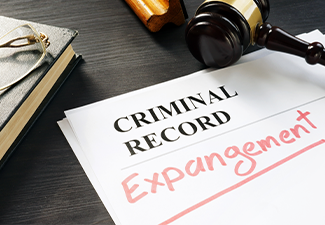Who Is Eligible for Expungement of Their Criminal Record?
Dec. 27, 2024
 In Missouri, the process of expungement allows individuals to remove certain criminal records from public view, helping them to rebuild their lives after a mistake or offense. However, not everyone is eligible for expungement, and the criteria can vary. That's why it can be beneficial to work with a St. Louis expungement attorney.
In Missouri, the process of expungement allows individuals to remove certain criminal records from public view, helping them to rebuild their lives after a mistake or offense. However, not everyone is eligible for expungement, and the criteria can vary. That's why it can be beneficial to work with a St. Louis expungement attorney.
Attorney Steven Hardin understands how important it is to determine your expungement eligibility for the sake of your future. That said, how do you know if you're eligible for sealing your criminal record?
How Expungement Works
Expungement is typically used to help people move past minor offenses that are no longer relevant to their lives or that are seen as no longer indicative of their character. Individuals must petition the court to have their records expunged, and this petition must meet specific requirements.
The law governing expungement in Missouri was significantly reformed in 2018 with the passing of Senate Bill 588. This bill expanded eligibility for expungement, allowing more people to apply for it. Of course, there are only specific types of offenses that may be eligible.
Types of Offenses Eligible for Expungement in Missouri
According to the Missouri Revised Statutes, under Section 610.140, only certain the types of criminal offenses can be expunged. Some of these categories include:
1. Non-Violent Felonies
In Missouri, some non-violent felony convictions are eligible for expungement after a waiting period. These offenses typically involve crimes such as drug possession, theft, and other property crimes.
The state recognizes that people convicted of non-violent felonies may be able to reintegrate into society successfully, and expungement helps reduce the lasting consequences of a criminal record.
2. Misdemeanors
Misdemeanors are generally eligible for expungement, but only after meeting specific criteria. Misdemeanants who have completed their sentences and not committed further offenses may apply for expungement of their misdemeanor convictions.
3. Certain Felony Convictions
Some felony convictions are eligible for expungement, particularly those that aren't deemed violent or sexual in nature. For example, certain drug-related felonies, theft crimes, and property offenses may be eligible for expungement.
4. Dismissed Charges and Acquittals
Charges that were dismissed or result in a verdict of not guilty (acquittal) are eligible for expungement. If a person was found not guilty of a crime or if the charges were dismissed, these records can be expunged without the need for a lengthy waiting period.
5. Convictions Related to Juvenile Offenses
Juvenile offenses, depending on the nature of the crime, may also be eligible for expungement. Juvenile records are generally treated differently, but expungement of juvenile offenses can allow young people to move past mistakes made during their youth.
The category of the offense you're charged with is only one piece of criteria considered when determining expungement eligibility. Speak to your St. Louis expungement attorney for more information about whether your type of offense.
Expungement Criteria
Eligibility for expungement in Missouri depends on a variety of factors, including the timing of the conviction and the individual’s criminal history. The following are the general criteria under which someone may be eligible for expungement in Missouri:
1. Waiting Period Requirements
A person must meet certain waiting periods after completing their sentence before they can petition the court for expungement. These waiting periods differ based on the type of conviction:
Felony convictions: Generally, a waiting period of seven years after completing the sentence is required for expungement. This period may be longer for certain offenses, especially those that involve violence or certain serious crimes.
Misdemeanors: A waiting period of three years after completing the sentence is generally required for misdemeanor convictions.
DWI/DUI offenses: Convictions for driving while intoxicated (DWI) or driving under the influence (DUI) require a waiting period of ten years after completing the sentence.
2. No Further Criminal Convictions
To be eligible for expungement, the person seeking expungement must have no subsequent criminal convictions during the waiting period. This is to make sure that the person isn't a habitual offender and has shown rehabilitation.
3. Completion of the Sentence
The individual must have fully completed their sentence, including any probation, parole, fines, or community service requirements. Only after completing all aspects of the sentence can a person seek expungement.
4. Eligibility Restrictions Based on Offense Type
Some offenses are categorically excluded from expungement eligibility. These include:
Sex offenses: Felony offenses related to sexual assault, sexual exploitation, and other sexual crimes are generally not eligible for expungement under Missouri law.
Violent felonies: Violent offenses such as murder, manslaughter, assault, and similar crimes are also typically excluded from expungement.
Certain drug trafficking offenses: While some drug offenses are eligible for expungement, certain trafficking crimes and offenses involving large quantities of illegal drugs may not be expunged.
Domestic violence offenses: Convictions related to domestic violence are generally not eligible for expungement.
5. No Pending Criminal Cases
To apply for expungement, a person must have no pending criminal cases. If the individual is facing charges or is on trial for another offense, they will not be eligible for expungement until their criminal cases are resolved.
6. Single Expungement in a Lifetime
Missouri law limits individuals to one expungement petition per lifetime. Therefore, an individual is only allowed to expunge one criminal record in their lifetime, so it's important to make sure that the petition is for the most significant offense or the offense with the greatest potential to impact their future.
Once you've determined that you meet the requirements for expungement, you may be wondering what the next step is in the process of clearing your criminal record.
The Expungement Process in Missouri
These steps are designed to make sure that the expungement process is carried out fairly and transparently. Reach out to your St. Louis expungement attorney for a better idea of what you can expect from your case.
1. Petitioning the Court
The first step in the expungement process is to file a petition with the court. The petition must include information about the individual’s criminal history, including the nature of the offense, the date of conviction, and the completion of the sentence.
A fee is required to file the petition for expungement, and the individual must submit a certified copy of the court record related to the conviction. The petition must also detail why the individual is eligible for expungement under Missouri law.
2. Review by the Prosecuting Attorney
Once the petition is filed, the prosecutor’s office will have the opportunity to review it. The prosecutor may object to the expungement if they believe the individual doesn't meet the eligibility requirements or if there's reason to believe that expungement isn't in the public interest.
3. Court Hearing
In some cases, a court hearing may be required to determine whether the expungement should be granted. During the hearing, the individual will present evidence supporting their petition, and the prosecutor may present any objections. The judge will then make a decision based on the facts presented.
4. Granting of Expungement
If the court grants the expungement, the criminal record will be sealed and made unavailable to the public. The individual’s record will no longer appear on background checks, and they'll be able to legally state that they haven't been convicted of the expunged offense.
5. Appeal Process
If the court denies the expungement petition, the individual may appeal the decision to a higher court. However, appeals can be difficult and time-consuming, and it's often helpful to work with a St. Louis expungement attorney throughout the process.
While the expungement process offers a second chance for many, it requires careful planning, attention to deadlines, and, in some cases, legal assistance. By meeting the eligibility requirements and working through the process successfully, individuals can improve their prospects for employment, housing, and overall integration into society.
Contact a St. Louis Expungement Attorney Today
If you're looking to seal your criminal record, The Hardin Law Firm is there for you. As an experienced St. Louis expungement attorney, Attorney Steven Hardin is dedicated to helping you fight for your rights and your future. Contact The Hardin Law Firm today to schedule a free consultation.
